|
What can Ageing Advocates Learn from the Disability Convention Process?
Global Action on
Aging, Side Event during the Commission for Social Development
February 6, 2008
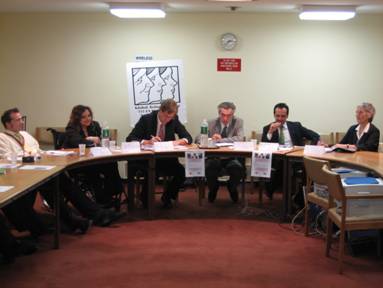
Frank
Schroeder, Maria Veronica Reina,
Andreas Pruisken, Johan Schőlvinck, Enrique Ochoa and Susanne Paul.
Global Action on Aging and the Freidrich Ebert Foundation, the organizers for this Side Event, wanted to explore how the International Disability Caucus NGOs managed their membership, their goals, their interactions with governments and the UN itself in the years preceding the adoption of the Convention on the Rights of Persons with Disabilities. The United Nations adopted the Convention after decades of advocacy and organizing in the Disability Rights movement. The Government of Mexico took the leadership as the “champion country” of the Convention proposal among the Member States. Many Aging NGOs hope to activate a similar movement to press for an aging convention. With this background, leading figures from the disability struggle shared their testimonies and experiences.
According to Johan Schőlvinck, Director for the UN Division for Social Policy and Development, three important policy documents can be a source of inspiration to a potential aging convention: The Madrid International Plan of Action on Aging, a non legally binding document adopted in 2002 that affirms the rights of older people, the Convention on the Rights of Persons with Disabilities, and the Declaration on the Rights of Indigenous People (a non legally binding instrument adopted in 2006). All reflect the emergence of “international norms,” and the growing commitment of Member States to “move in certain directions and abide by certain principles.”
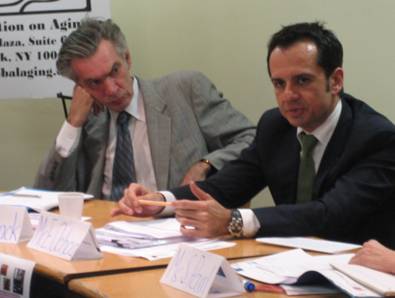
Johan Schőlvinck and
Enrique Ochoa.
Maria Veronica Reina, Executive Director of the Global Partnership on Disability and Development (GPDD), revealed a ‘good recipe’ to get a convention. She shared her experience as a major leader in the International Disability Caucus, a group composed of more than 70 NGOs that lobbied for the Disability Convention. For her, success came from the unity of this group that emerged from compromises, dialogue and transparency. Having the same goal helped create a strong team spirit. Ms. Reina explained that the consequence of being united but diversified is to tolerate ambiguity. You cannot be too demanding but must share the same values as your partners. ‘We agreed, but we didn’t know how much.’
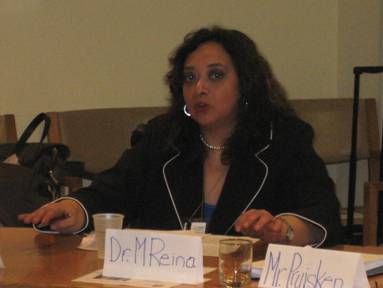
Maria
Veronica Reina.
Enrique Ochoa Martinez, the first Secretary at the Permanent Mission of Mexico to the United Nations, described how his government decided to “champion” the effort for a disability convention. Mexico had already been a leading country advocating for a disability convention. According to Enrique Ochoa, the most important element in the argument supporting a convention rests on showing the “added value” of your text when compared to previous conventions and resolutions that already exist. In June 2001, Mexican President Vicente Fox expressed the need of a special disability convention. By December, a special Committee was established to talk about the principles to be contained in the Convention, with the help of NGOs.
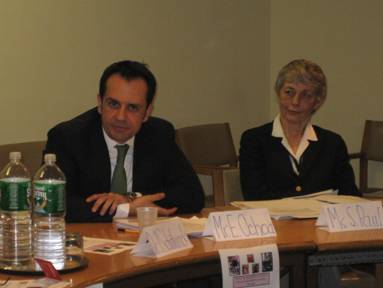
Enrique
Ochoa and Susanne Paul.
The last speaker, Andreas Pruisken, is Coordinator for Global Alliances, Christian Blind Mission, a German-based development organization that relates to blind persons living in poor countries. Since the majority of older people today live in developing countries, they are often excluded from health care and decent work. Indeed, older persons in poor countries are likely to be very poor themselves and about half suffer a disability. Pruisken said that an aging convention would help affirm the human rights of older
persons.
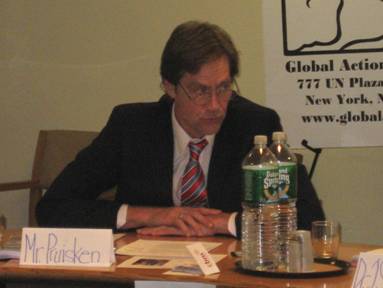
Andreas Pruisken.
To conclude, the speakers reaffirmed the necessary measures to launch a movement to adopt an aging convention: A strong united caucus composed of representatives of NGOs, along with a high political commitment from Member States.
|



